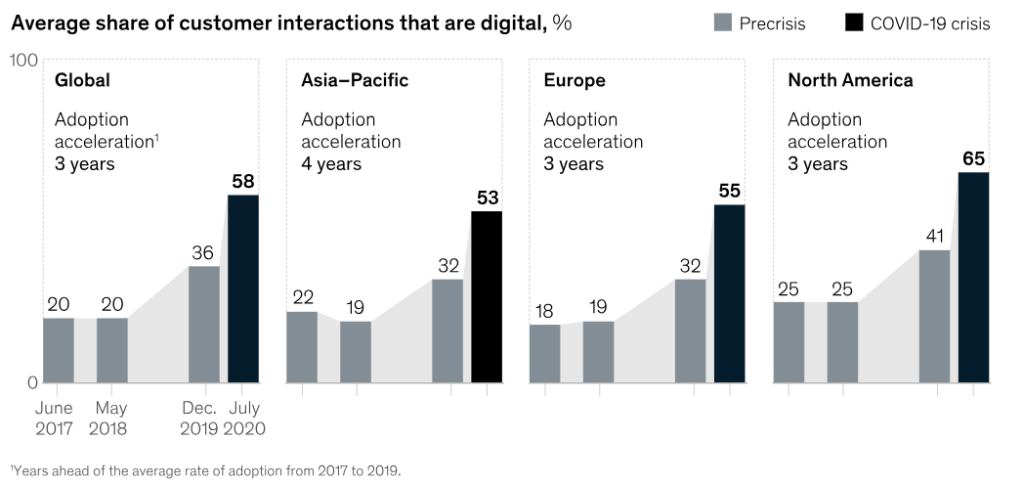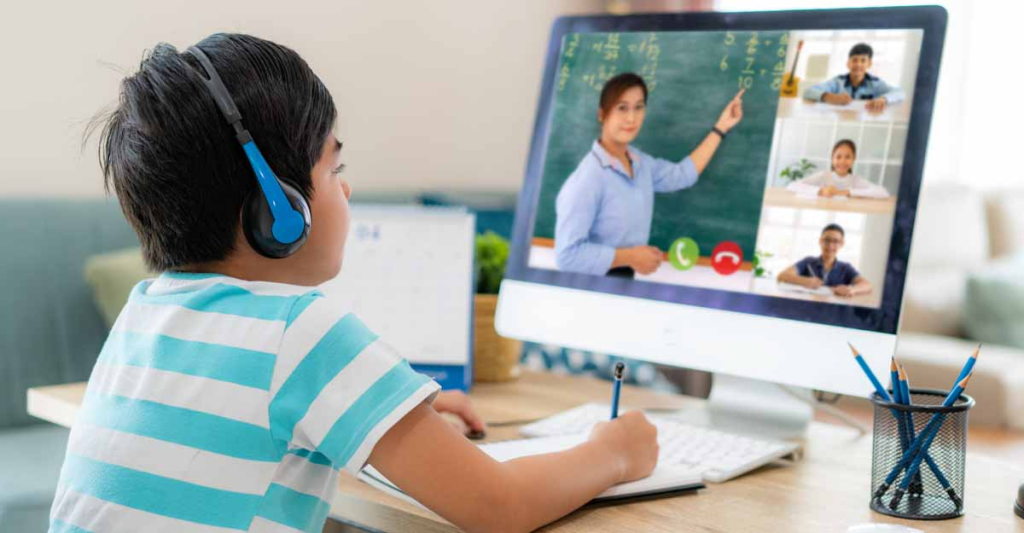As this course is coming to an end I think we have all realised it: the world is digitalising and oh boy is it going fast. Something that has certainly sped digital innovations up has been the Covid-19 pandemic that lasted for an extensive period of time. Due to nationwide lockdowns and social distancing norms the rapid digital adjustments were inevitable, as we had to adjust to new ways of life, such as working from home, increase in Blockchain Technology, and a rise of gig workers (1). Now, after the pandemic, quite a few of these innovations have stayed, and I must say that I am not too happy about some of these “innovations”.

Online working and school
With lockdowns and social distancing, almost all people had to work from home, and students had to follow their lessons from home. However, after everything opened up again, working from home and online education had become a lot more common. Especially working from home, as I read in research from the American Economic Association that twice as many workers work from home full time after the pandemic, and that for most people, one in five instead of one in seven days is work from home (2). I also noticed changes in my studies as there was way more online lectures, prerecorded lectures and self-study hours after covid.
Working from home had already proven to have quite some disadvantages in the covid-era. The RIVM for example found out that people working from home had way higher risk of health problems such as back pain and other physical complaints from bad work equipment. Also the mental health of people working from home was negatively affected, people working from home showed way higher risk of feeling alone and isolated from the rest of the world (3).
I also read in research that online classes were way less favourable for both students and teachers. Regular in person classes were found to be more efficient, interaction and understanding. The overall knowledge transfer and learning process were just better (4). These are all things that I recognize for myself, as I found it hard to pay attention and actually be productive in online classes, and also struggles I have heard among a lot of my peers.
However, there are some advantages to online learning in terms of comfort and convenience. Especially if the infrastructure improves, which already had happened enormously since the pandemic. I think that I maybe should try to work on some of my struggles as it probably will be inevitable.

Digitalisation in public places
First of all, I have noticed that some social interactions in everyday life have been digitalised, or now involve the use of a digital device, which makes the interaction way less social and pure. I think that a good example of this (which also greatly frustrates me ;)) is the menus and ordering at restaurants. Before covid, all restaurants had paper menus which a server would bring to your table or would already be there. During covid, it was due to the spread of germs on these menus that restaurants would introduce a digital menu which could be read on your phone, for example by scanning a QR-code. Sometime there even was the option to directly order so that the server would not have to have to much interaction. After covid, in quite some places this stayed (4). The problem with this for me is that now everyone at the table is looking on their phones, firstly to see the menu but they often get distracted and stay on their phone for longer. In my opinion, this really kills some of the coziness of eating at restaurant. I also miss the interaction with the server if there is an online ordering option. These things just kill the cozy vibe a bit for me.
I could not find other sources that agree with me on this, as these QR-code menus become more widely accepted (4). It does also come with the negative consequences that some people do not understand how to work with a QR-code, and that there are other technical complications. But there is also a great amount of benefits listed, which means I probably will have to accept this becoming common.

References:
- https://www.ncbi.nlm.nih.gov/pmc/articles/PMC7280123/
- https://www.aeaweb.org/articles?id=10.1257/mac.20210061
- https://www.rivm.nl/en/news/people-working-from-home-more-likely-to-have-health-problems#:~:text=The%20results%20showed%20that%20people,alone%20and%20isolated%20from%20others.
- https://www.sciencedirect.com/science/article/pii/S0738059321000973#sec0180
- https://www.restolabs.com/blog/qr-menus-for-restaurants


i do think you’re write on a lot of levels but these kinds of changes are overall beneficial as this will not be the last pandemic we go through. its also quite sad that we were shown all the weaknesses of our current systems. turns out uni websites cant quite handle every student suddenly going online at the same time. servers became overloaded. restaurants which had delivery options were forced to convert their wait staff into drivers. i was one of them and it was not what i signed up for. I do however still agree that it has overall affected how we behave, our attention spans and increased the amount of time we spend starring at screens
QR codes in restaurants indeed pose more risk for distraction which negatively impacts social aspects. Still, great scale digitalisation is inevitable which leads us to have no choice but to adapt. As much as I prefer physical menu’s, using the QR code does more in making me reflect upon my relationship with my phone. Such reflection through confrontation might be more beneficial in improving personal relations with the digital. As I grumble and criticise at the dinner table about the digitalisation of menu’s, I find more motivation in doing more to be mindful about how we interact with the digital. What I mean with this is that because of my QR code frustration, I for example would be more motivated to digitally detach myself and read a book that evening instead of scrolling around. Maybe digitalisation is just what we need for us humans to really reflect on what the best balance is between the digital and ‘real’ life.
I also really have noticed the downsides of the digitization of studying, as someone who really has difficulties with motivating myself to go to lectures (especially since i travel 3 hours by train) the fact that everything was digitalized was detrimental to me actually showing up last year and it certainly put a lot of stress on me when the exam period came up and i hadn’t really forced myself to go to the lectures because, “i could just watch them at home”, but then i never did. also i never really noticed hoe the change in restaurant menus really came from the covid period and while i dont mind them myself i can see how people like the elderly could have a lot of troubles with these new systems.
I see a couple of other people have already commented about the QR-code menus, to which I agree to generally be a downgrade to the physical ones (also because the physical aspect of the map simply keeps you grounded, and is almost a kind of ritual to get ready for the meal). I wanted to talk about the working-from-home aspect. I personally do recognize the difficulties with online lectures, but in cases where normally class would get cancelled, I am glad that it is a possibility. Rather that, then no lecture at all, or have all the info from this lecture to be cramped into the next one. I think the lingering effects should be used wisely, and especially for students sparingly. Speaking of using the new digital logistics wisely, my mother seems to actually thrive with this partially remote work-mode. She works online 3 days, and goes back to the office for 2. Because of the lack of travel she has way more time and energy for fun things, which I am glad to say really improves my mother’s mental health. I cannot fully credit this to working partially remotely, but I am pretty sure this way of working does benefit some. So I think the key is to see what works for every individual, and communicate with others to find what works best.